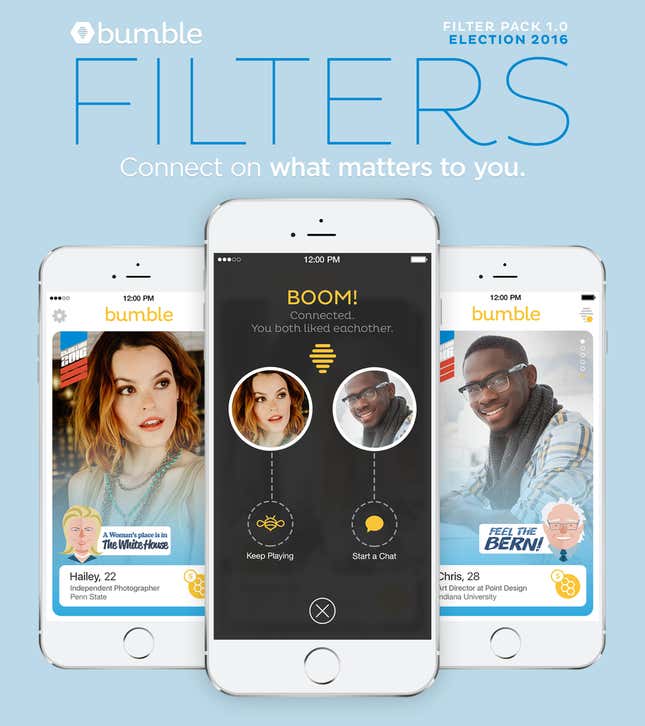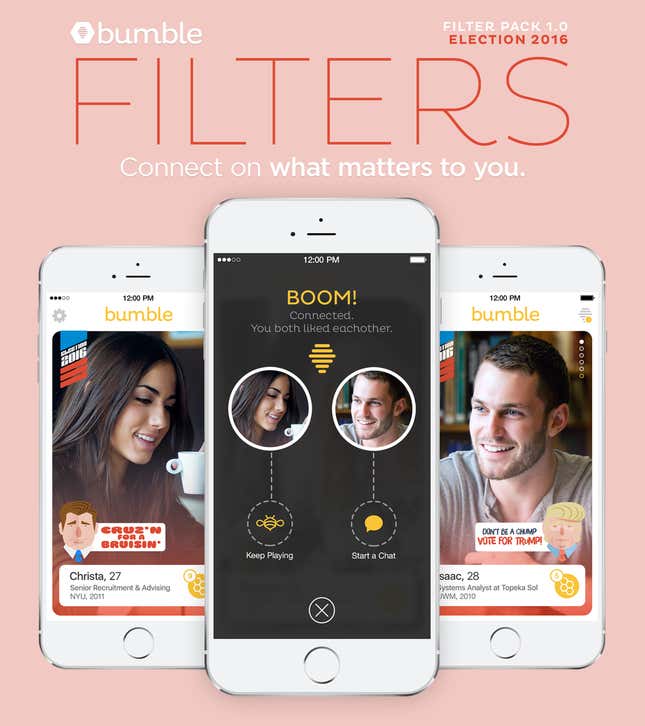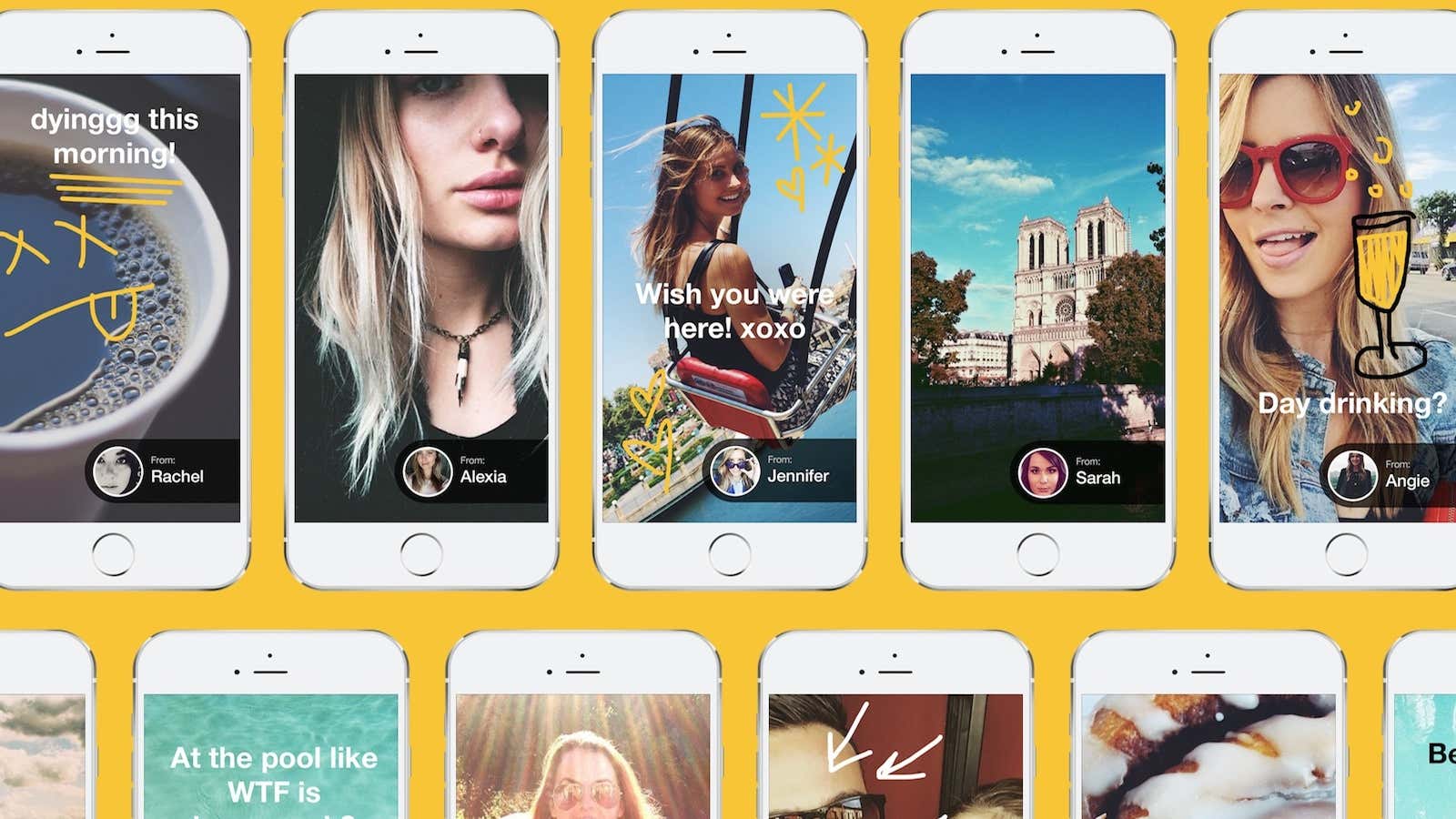The popular dating app Bumble now lets you boast about which presidential candidate you support, and filter out your potential matches accordingly. The app’s filters will also include more generally partisan themes (“I’m voting Democrat,” and “I’m voting Republican”), as well some less serious options: #IDGAF, “Pizza for President,” and #Kanye2020.
But some users are dubious, saying they don’t want to close themselves off to dates that reach across party lines—but with a notable exception for people who support Donald Trump.
“I don’t think it’s a good idea,” says Sarah, 25, a graduate student who typically votes for Democrats. “People meet people with opposing political views and it exposes them to new ideas … Everyone’s out there, and you’re meeting people you might not otherwise meet. Just look at John Oliver and his Republican wife! People fall in love across party lines all the time.”
“If it could filter out Trump voters, then yes, I would probably use it,” she concluded. “But not all Republicans.”

“It’s unnecessary,” says Carly, 24, a writer and comedian who is also a registered Democrat. “J-Swipe already has political filters, and I don’t use them.”
She admits her views on this might be a tad old-fashioned: “I’m not one to advertise who I vote for. That’s a very personal question.”
Like Sarah, however, she sees some value in the feature’s ability to eliminate suitors with politically extreme views. “If I were on a decent date and the guy told me he was a Republican, I’d probably see him again—unless he turned out to be, like, rabidly anti-abortion. But if someone told me they were a Republican and they were voting for Trump, I’d probably pretend to use the lady’s room and quietly leave the restaurant out the back.”
“I imagine it would streamline the search process if you weed out a subset of people that [you] don’t have any interest in dating,” says Kathryn, 25, who works for a public interest nonprofit. She’s particularly interested in green politics, and living in Colorado, a number of her potential matches work in the oil and gas industry—a field that often leans right.
“I don’t want to date someone that is actively working in an industry that is destroying the environment,” she says.
Torrie, 25, is a photographer who considers herself liberal, would conversely seek out the occasional date with a Trump voter: “Can I use it to filter out everyone but Trump supporters so I can go on a bunch of hilarious dates?”
She hypothesizes that any Trump supporters she swipes right on will be gainfully employed, “so they would probably take me out for a nice meal and not a dollar beer.”
“I’d get to eat for free, hear some hilarious nonsense, then rail into someone for supporting Trump,” she adds. “Perfect date.”
Some male dating app users Quartz spoke with were generally less decisive about the filter package’s usefulness.
“I would never filter like that,” says John, 29, who works in marketing. He sees himself as a political moderate and says ideology doesn’t play a big role in his choice of dates. “Any type of extreme would be weird,” he says, “But that’s only one part of a tapestry of a person.”
When asked if this philosophy would apply to, say, a Trump or a Ted Cruz supporter, he says, “Why not? I’d be fascinated by that type of person. It wouldn’t be an absolute deal breaker. If the first date was good, I’d want a second date to fully understand why they feel the way they do.”
For Ed, 28, who works in advertising, politics are more of a no-go zone, at least when it comes to physical dates. “I try to avoid talking politics on dates because it’s such a minefield topic to navigate with someone you haven’t spent a lot of time with.”

He’s learned from experience, recalling a date he set up through Tinder where politics made an uncomfortably early entrance: “About halfway through the appetizer she asked my opinion on Reagan. My opinion on Reagan is not favorable. What ensued was a loud argument that lasted through the entree to getting the check, on the effectiveness of trickle-down economics—a topic I normally wait until date three to broach.”
“We ended with a very quiet walk to the subway station and a very half-hearted hug,” he says.
For this reason, getting a peek into someone’s politics before actually meeting up can be useful, he thinks. “The implementation seems pretty cheesy,” he says of the Bumble filters. “But when trying to start a serious relationships in a city of eight million, having one less thing to guess is super helpful.”
He won’t be slinging a badge up on his own profile anytime soon, however. “I’m not putting one up for the same reason I don’t put up bumper stickers—they feel really tacky. It other people have them up though, it’ll factor into which way I swipe.”
Like most, he’s not entirely sure such increased selectivity is necessarily a good thing in a mobile-dating landscape already riddled with superfluous customized preferences. “I do kind of have a morbid curiosity driving me to try meeting up with a few Trump supporters,” he admits. “Just to see what happens.”
This isn’t the first time that politics and romance have mixed on dating apps this election cycle. Tinder, in partnership with Rock the Vote, also launched a feature for those users who are paying close attention to the primaries: matching people with the presidential frontrunner most closely aligned to their views. Users can swipe left or right—left for “disagree,” right for “agree”—on a series of ten policy questions and Tinder will reveal who they should vote for. Tinder will also share information about how to register to vote. (Sanders won the app’s “Swipe the Vote” promotion with 37.8%, narrowly trailed by Hillary Clinton; Texas senator Ted Cruz led Republicans with 14.3%, followed by Trump with 8.1% and John Kasich with 2.3%.)
Two Bernie supporters made headlines for using Tinder to campaign for their candidate—reaching out to potential dates and encouraging them to “Feel the Bern.” But they were quickly blocked from the app. Several Marco Rubio campaigners tried the same tactic and were disavowed by his campaign.
Additional reporting by Frida Garza.
